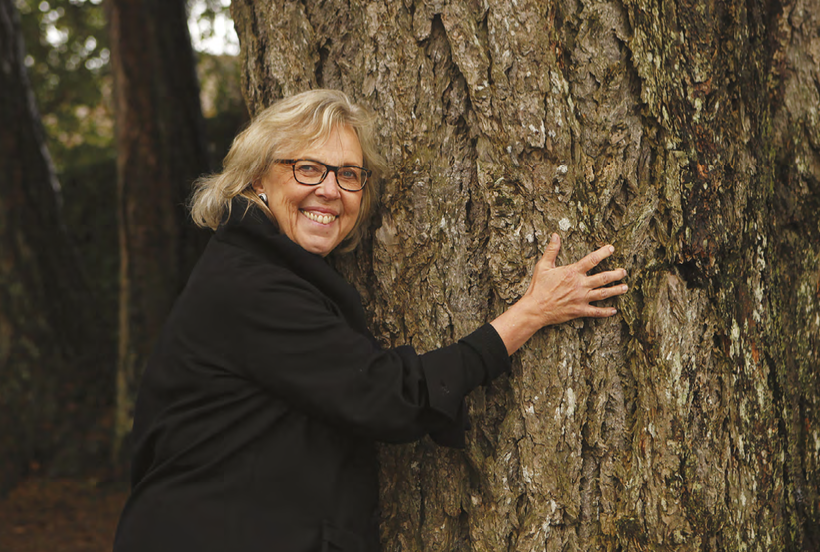By Rob Lutes
A Member of Parliament and one of the country’s foremost environmental advocates, the leader of the Green Party of Canada reflects on her origins, her accomplishments, and the challenges ahead
Where were you born, and where did you grow up?
I was born in Hartford, Connecticut. We lived in the same house for 18 years—not in Hartford but in a rural area, a town called Bloomfield. We moved from there when I was 19—my mom and dad had fallen in love with Cape Breton Island, and so my parents and my brother and I and a menagerie of animals all moved to a very small village, Margaree Harbour.
I hadn’t finished university when we moved; I had just barely started. Long story short, my parents were impulsive and decided it would be just lovely to buy a tourism business on an old schooner that had a restaurant that had been closed down. So we moved and sank all of our life savings and then some into opening a business that my parents had no idea how to run. But it would be so much fun. However, we went very broke very fast, and I never did get an undergraduate degree. [May later attended Dalhousie Law School as a mature student, though, graduating in 1983.]
Were there other reasons behind your parents choosing to make that move?
My dad was British and had grown up just outside of London during the Second World War. He was really affected by the Blitz. And my mom was very much American—grew up outside New York City. My parents met at Columbia University. But my dad never really liked the US. Things got worse and worse through the Vietnam War years—both my parents were politically active, particularly my mother—and I think that was a big part of why we moved. So my life story has a very sharp demarcation at age 19.
What was life like for you on Cape Breton Island?
I ended up waitressing and cooking full time through my 20s in our family business. We were really up against it economically, except for the fact that we had this enormous asset in a restaurant-gift shop that was closed in the winter. We tried to break even in the summer.
Where did you develop your special appreciation for nature?
It is a big thing in my life. I can’t explain why it is that I feel very, very attached to the natural world. My mother used to tell a story. When I was maybe two, I told her I hated airplanes. She asked why, and I said, “Because they scratch the sky.” So that suggests some kind of heightened awareness or connection to nature. Where I grew up in Connecticut was rural. We had seven acres, and for most of my childhood, we had a couple of ponies, sometimes a don- key, assorted sheep, lots of chickens. We had a rural existence, and I was very connected to the plants and the animals and this really quite lovely area.
You’ve worked for many years as an advocate for the environment. When did you begin that kind of work?
I had some campaigns in high school in the States before we moved, but the first big campaign was in 1975 against an insecticide that was being used to kill spruce budworms in Nova Scotia. That was successful. And then in 1982, the same company decided not to spray bugs this time but to use a herbicide that had been used in Vietnam called Agent Orange to remove what they called “the competition”—competition with the softwood.
So where you had raspberry bushes and shrubs, they wanted to eliminate all that. It’s just so bizarre when you think about it. That went to a trial that lasted a very long time in which the judge ultimately ruled that spraying Agent Orange was safe and that we owed the company potentially millions of dollars in costs and damages. [The herbicide was banned in Canada before the company could use it in Nova Scotia.]
By then I was a practising lawyer in Halifax, and I couldn’t stand running into the lawyers who’d represented the pulp companies—my family had lost our land and a lot financially fighting them—so I found myself looking for work elsewhere. I moved to Ottawa to take a position with the Public Interest Advocacy Centre, and then I ended up being recruited away from that job by the Minister of the Environment, who was from Prince Edward Island and a Red Tory in the Mulroney government.
I was a senior policy adviser from 1986 to ’88, which was a fantastic experience. I worked on the negotiations for the Montreal Protocol to protect the ozone layer, and I worked on acid rain. One of the greatest victories of my life was stopping the clear-cut logging of Haida Gwaii and creating the Gwaii Haanas National Park Reserve there. I was privileged to be part of that—it would never have happened if I hadn’t been kind of the right person at the right time in that job. I was behind the scenes, but I definitely learned a huge amount about how government works and how legislation is passed.
Your advocacy work included 17 years as executive director of the Sierra Club of Canada. How did you eventually become leader of the Green Party?
Around 1999, I started talking to my mom about what I was going to do after the Sierra Club. I couldn’t stay there forever; it wouldn’t have been healthy for the organization. And I couldn’t go to another environmental organization and be an executive director; that didn’t make any sense. We went through a range of options, and I can remember very specifically saying “I’m sure I don’t want to go into politics.” By that point, everyone from Paul Martin to Alexa McDonough [leader of the Nova Scotia New Democratic Party from 1995 to 2003] to Progressive Conservatives who were working with Joe Clark—almost every political party at one time—had asked me to be a candidate for them. And I always said: “No, I don’t think so. I think I’m able to do more good here.”
The reason I decided to do it was the NDP deciding to work with the Conservatives and the Bloc Québécois to defeat Paul Martin’s Liberal minority government and put Stephen Harper in place instead. I was devastated by that. We were organizing for COP 11 [the United Nations Climate Change Conference] in Montreal. It opened on November 28, 2005—the day they brought down Martin’s government. He had just put forward a really solid Kyoto plan and the Kelowna Accord and universal child- care across the country with agreements signed with every single province. So at that moment, I realized that if I was going to be fighting Harper, I couldn’t do it from the Sierra Club of Canada. I figured: “I need to be in a debate situation where I can take him on. I have to enter politics.”
I quit my job at the Sierra Club. I had no income, so it was all very nip and tuck and financially reckless, but I got through and won the leadership [in 2006], and then eventually, within five years, I won a seat in Parliament, which a lot of people thought would never happen. [May was the first Green Party MP ever elected.]
As you think about all of your victories and defeats, what is it that keeps you from saying “That’s it; I’ll pass the torch to the next person to take up the fight”?
I’m a grandmother. I have a moral responsibility to my own family and to the planet, mother earth, right? But in particular, I have a moral obligation to my daughter, who wants to have children. We just don’t walk away from the climate crisis when we can do something about it. I could not cope if I had no agency. I couldn’t just pretend it wasn’t happening and go on a cruise.
I mean, yeah, it’s happening. It’s a devastating threat to our future. And it’s avoidable. And it’s within my powers and abilities as a human being to do something about it, to make a huge difference. That’s why I keep trying. You never know until you try whether you can make a difference or not. And one of the things I think of, over the length of my time working in the movement, is that I’ve had more victories than failures. So I think “Okay guys, this is the next time; we’ll turn the corner this next time.” So I never give up.
You’re not going to go away.
I can’t imagine that. I had a hemorrhagic stroke on June 29 [2023] that nearly killed me. The day I had the stroke, I had worked 51 days in a row, and many of them were 19-hour days back-to-back. And you know, that’s not so smart. At that point, I was already 69. But I’m very, very lucky. Because, as you can see, it didn’t do any damage. And rest and retiring are not on my mind.
Image: Chad Hipolito






